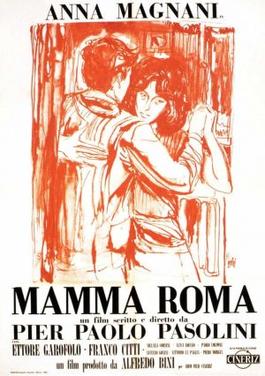Putting a force of nature like Anna Magnani in among the unknowns and non-professionals of the rest of the cast almost upends Pasolini's film, and it reportedly caused some friction between actress and director during the filming. If Pasolini really wanted the naturalistic Magnani of
Rome, Open City (Roberto Rossellini, 1948) it was much too late: By then, she had won an Oscar for
The Rose Tattoo (Daniel Mann, 1955) and had become the flamboyant, histrionic Magnani who shows up on-screen in
Mamma Roma. That said, Pasolini certainly gave her every opportunity to present herself that way, starting with the opening scene in which she herds pigs into the wedding dinner of her former pimp, Carmine (Franco Citti), and culminating in one of the greatest scenes (or rather, pair of scenes) of her career. I mean, of course, the long-take tracking shot in which she walks down a Roman street at night, delivering a monologue on her life, as people appear out of the darkness and recede back into it, serving as interlocutors. It's stunning the first time Pasolini (aided by his cinematographer, Tonino Delli Colli) does it, and even more remarkable when he reprises it after a crisis in her life. I think
Mamma Roma is some kind of great film, notwithstanding Pasolini's tendency to be somewhat heavy-handed in his symbolism: witness the staging of the wedding dinner as a parallel to Leonardo's
The Last Supper and of Ettore (Ettore Garofalo) strapped to a restraining bed to echo Mantegna's painting of the dead Christ.
 |
| Top: Ettore Garofalo in Mamma Roma. Below: Andrea Mantegna, Lamentation Over the Dead Christ, c. 1475-78 |


